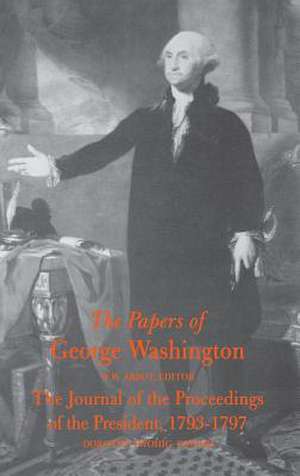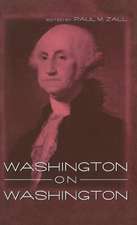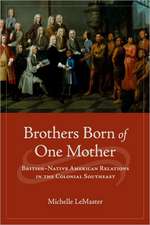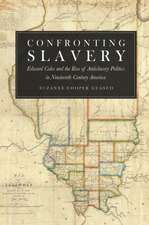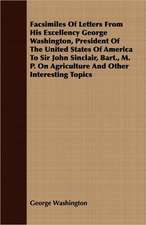The Papers of George Washington
Autor George Washington Editat de W. W. Abboten Limba Engleză Hardback – vârsta de la 22 ani
Volume 19 of the Presidential Series (October 1795 through March 1796) features the final stages of the controversy about the 1794 Treaty of Amity, Commerce, and Navigation with Great Britain (the Jay Treaty). In August, George Washington had ratified the treaty, with a condition attached by the Senate, and he now awaited news of British ratification. Newspaper critics continued to inveigh against the treaty, and the attached condition led some to believe that the entire treaty would have to be resubmitted to the Senate. Washington, however, decided otherwise. After receiving news of the exchange of ratifications in London, he proclaimed the treaty on 29 Feb. 1796.
Critics now contended that the treaty could not take effect without the consent of the House of Representatives because its provisions encroached upon areas constitutionally delegated to Congress. Could the Senate and the executive use the treaty-making power to legislate by themselves? Pursuant to that theory, Edward Livingston introduced a resolution calling on Washington to supply documents relative to the treaty negotiations. After consulting with his cabinet and Alexander Hamilton, the president refused to supply any material. His explanatory message to the House disputed the opponents' view of the treaty-making power and, in an important precedent, claimed executive privilege.
Other treaty negotiations proved less controversial. Washington received news that treaties had been reached with Algiers and Spain, and the existing treaty with Morocco had been reaffirmed.
Despite a ceremonial exchange of flags, tensions grew between France and the United States, in large part because of the Jay Treaty. When a private letter from Washington to Gouverneur Morris was intercepted by a French ship and read by the French government, it, too, had "an ill effect."
In these circumstances, the Marquis de Lafayette's continued imprisonment in Austria and the arrival of his son in America forced the president to weigh his personal feelings against his responsibility as head of state. Washington immediately offered assistance to the young man but felt obliged for a time to keep him at a distance, lest he offend the French government. Nonetheless, by the end of March it was clear that he intended to take the young man into his household.
Another continuing issue was Edmund Randolph's effort to vindicate his conduct as secretary of state. In the end, Washington's friends assured him that Randolph's published Vindication did more damage to himself than to the president.
Highlighted domestic issues include Indian relations and the Federal City. Washington opened his annual message to Congress by announcing the Treaty of Greenville with the Northwest Territory tribes and reports of the "wanton murders" of Creeks by some Georgia citizens. To promote peace on the frontier, he asked Congress to find "means of rendering justice" to the Indians and to act on his proposal for Indian trading houses.
When the Federal City commissioners reported that a shortage of money threatened to slow construction, Washington corresponded with them about their plans to obtain money from Europe and their applications for assistance from the Maryland legislature and from Congress.
Other documents discuss land acquisition for a federal armory at Harpers Ferry, Va., and the president's efforts to fill two cabinet positions and two Supreme Court vacancies.
In his personal life, Washington continued to act as the head of his extended family, approving the marriage of Elizabeth Parke Custis and offering continued financial assistance to his niece Harriot Washington. He also maintained weekly correspondence with his farm manager about operations at Mount Vernon, and he received reports about the collection of rents from his lands in western Virginia and Pennsylvania. A final settlement of his long and complicated executorship of the Thomas Colvill estate seemed near. Much correspondence in February and March 1796 concerns Washington's advertisement offering for sale his western lands and for lease all but the Mansion House farm at Mount Vernon. As he anticipated retirement, the president sought to simplify his affairs.
The correspondence volumes of The Papers of George Washington, 1748-99, published in five series, include not only Washington's own letters and other papers but also all letters written to him. The ten-volume Colonial Series (1748-75) focuses on Washington's military service during the French and Indian War and his political and business activities before the Revolution. The massive Revolutionary War Series (1775-83) presents in documents and annotations the myriad military and political matters with which Washington dealt during the long war. The papers for his years at Mount Vernon after leaving the army and before becoming president have been published in the six-volume Confederation Series (1784-88). The remaining years of Washington's life are covered in the Presidential Series (1788-97), which includes the papers of his two presidential administrations, and the four-volume Retirement Series (1797-99), which includes his correspondence after his final return to Mount Vernon.
Preț: 682.03 lei
Preț vechi: 885.75 lei
-23% Nou
130.51€ • 139.56$ • 108.81£
Carte tipărită la comandă
Livrare economică 17 aprilie-01 mai
Specificații
ISBN-10: 0813908744
Pagini: 393
Dimensiuni: 156 x 234 x 24 mm
Greutate: 0.75 kg
Editura: University of Virginia Press
Descriere
Bad weather plagued Gen. George Washington's army during its winter encampment near Morristown, NJ, far into the spring of 1780. Finances caused further woes. Commissaries lacked both cash and credit to obtain provisions, and food shortages meant restless troops. Only vigorous exertions by supply officers kept Washington's army intact.
